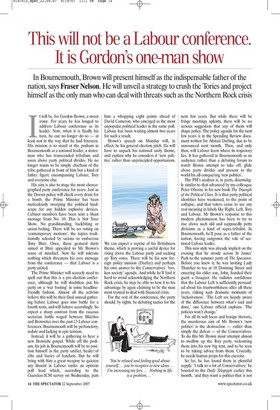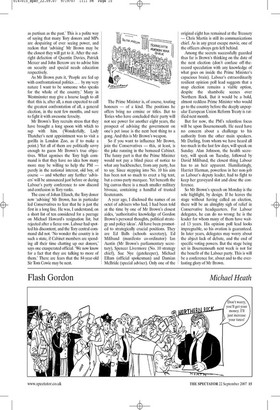This will not be a Labour conference. It is Gordon's one-man show
In Bournemouth, Brown will present himself as the indispensable father of the nation, says Fraser Nelson. He will unveil a strategy to crush the Tories and project himself as the only man who can deal with threats such as the Northern Rock crisis 1 t will be, for Gordon Brown, a sweet irony. For years he has longed to address Labour conference as its leader. Now, when it is finally his turn, he can no longer do so — at least not in the way that he had foreseen. His mission is to stand at the podium in Bournemouth as a national leader, a statesman who has transcended tribalism and soars above party political divides. He no longer wants to be simply chieftain of the tribe gathered in front of him but a kind of father figure encompassing Labour, Tory and everyone else.
His aim is also to stage the most choreographed party conference for years. Just as the Dorset police will check every drain for a bomb, the Prime Minister has been meticulously sweeping the political landscape for any hidden explosive devices. Cabinet members have been sent a blunt message from No. 10: This is Not Your Show. No grandstanding, backbiting or union-baiting. There will be no voting on 'contemporary motions', the topics traditionally selected by unions to embarrass Tony Blair. Once, these gestural darts aimed at Blair appealed to Mr Brown's sense of mischief. Now he will tolerate nothing which threatens his core message from the conference — that Labour is a party united.
The Prime Minister will scarcely need to spell out that this is a pre-election conference, although he will doubtless put his party on a 'war footing' in some headlinefriendly fashion. Almost all the activists believe this will be their final annual gathering before Labour goes into battle for a fourth term, and will behave accordingly. So expect a sharp contrast from the raucous sectarian battle waged between Blairites and Brownites over the past 13 Labour conferences. Bournemouth will be perfunctory, sedate and lacking in epic tension.
Instead, it will be a gathering to hear a new Brownite gospel. While off the podium, his job in Bournemouth will be to position himself as the party unifier, healer of rifts and burier of hatchets. But he will bring with him a great weapon to quieten any dissent in Labour ranks: an opinion poll lead which, according to the GuardianlICM survey on Wednesday, puts him a whopping eight points ahead of David Cameron, who emerged as the most unpopular political leader in the same poll. Labour has been waiting almost two years for such a result.
Brown's speech on Monday will, in effect, be his general election pitch. He will have to unpack his national unity theme, and explain why he considers it 'new politics' rather than unprincipled opportunism.
We can expect a reprise of his Britishness theme, which is proving a useful device for rising above the Labour party and sucking up Tory votes. There will be his new foreign policy mission (Darfur) and perhaps his own answer to the Conservatives' broken society' agenda. And while he'll find it hard to avoid acknowledging the Northern Rock crisis, he may be able to turn it to his advantage by again claiming to be the man most trusted to deal with financial crisis.
For the rest of the conference, the party should, by rights, be debating tactics for the next few years. But while there will be fringe meetings aplenty, there will be no serious suggestion that any of them will shape policy. The policy agenda for the next few years is in the Spending Review document written for Alistair Darling, due to be announced next month. Then, and only then, will Labour learn where its trajectory lies. It has gathered in Bournemouth as an audience rather than a debating forum to watch Brown attempt to take off, glide above party divides and present to the world his all-conquering 'new politics'.
The PM's analysis is, in parts, disarmingly similar to that advanced by my colleague Peter Oborne in his new book The Triumph of the Political Class. It is that party political identities have weakened, to the point of collapse, and that voters cease to see any real meaning in labels like Right, Left, Tory and Labour. Mr Brown's response to this modern phenomenon has been to try to rise above such old and supposedly petty divisions as a kind of supra-tribalist. In Bournemouth, he'll pose as a father of the nation, having outgrown the role of sectional Labour leader.
This new style was already implicit on the evening that he strode across St James' Park to the summer party of The Spectator. Before you knew it, he was inviting Lady Thatcher to tea at 10 Downing Street and ensuring his elder son, John, handed their guest a bouquet. He radiates confidence that the Labour Left is sufficiently persuaded about his trustworthiness after all these years, risking such dramatic moments of 'inclusiveness'. 'The Left are keenly aware of the difference between what's said and done,' one Labour official explains. 'The policies won't change.'
For all its soft focus and benign rhetoric, the murderous aim of Mr Brown's 'new politics' is the destruction — rather than simply the defeat — of the Conservatives. To do this Mr Brown must attempt almost to swallow up the Tory party, welcoming them into his new big tent, and to be seen to be taking advice from them. Crucially, he needs human props for this exercise.
So far, he has found them in plentiful supply. 'I talk to a lot of Conservatives,' he boasted to the Daily Telegraph earlier this month, 'and they want a politics that is not as partisan as the past.' This is a polite way of saying that many Tory donors and MPs are despairing of ever seeing power, and reckon that 'advising' Mr Brown may be the closest they will get to it. After the outright defection of Quentin Davies, Patrick Mercer and John Bercow are to advise him on security and special needs education respectively.
As Mr Brown puts it, 'People are fed up with confrontational politics .. . by my very nature I want to be someone who speaks for the whole of the country.' Many in Westminster may give a hoarse laugh to all that: this is, after all, a man expected to call the greatest confrontation of all, a general election, in the next few months, and sure to fight it with awesome ferocity.
Mr Brown's Tory recruits stress that they have brought a long spoon with which to sup with him (Wonderfully, Lady Thatcher's next appointment was to visit a gorilla in London Zoo, as if to make a point.) Yet all of them are politically savvy enough to guess Mr Brown's true objectives. What agonises the Tory high command is that they have no idea how many more may be willing to help the PM — purely in the national interest, old boy, of course — and whether any further 'advisers' will be announced just before or during Labour's party conference to sow discord and confusion in Tory ranks.
The case of Johan Eliasch, the Tory donor now 'advising' Mr Brown, has in particular led Conservatives to fear that he is just the first in a long line. He was, I understand, on a short list of ten considered for a peerage on Michael Howard's resignation list, but rejected after a fierce row. Labour had spotted his discontent, and the Tory central command did not. 'No wonder the country is in such a state, if Cabinet members are spending all their time chatting up our donors,' says one exasperated official. 'We now know for a fact that they are talking to more of them.' There are fears that the 84-year-old Sir Tom Cowie may be next.
The Prime Minister is, of course, touting honours — of a kind. The positions he offers bring no ermine or titles. But to Tories who have concluded their party will not see power for another eight years, the prospect of advising the government on one's pet issue is the next best thing to a gong. And this is Mr Brown's weapon.
So if you want to influence Mr Brown, join the Conservatives — this, at least, is the joke running in the bemused Cabinet. The funny part is that the Prime Minister would not pay a blind piece of notice to what any backbencher, from any party, has to say. Since stepping into No. 10 his aim has been not so much to erect a big tent, but a cross-party marquee. Yet beneath the big canvas there is a much smaller military bivouac, containing a handful of trusted lieutenants.
A year ago, I disclosed the names of an octet of advisers who had, I had been told at the time by one of Mr Brown's closest aides, 'authoritative knowledge of Gordon Brown's personal thoughts, political strategy and policy ideas'. All have been promoted to strategically crucial positions. They are Ed Balls (schools secretary), Ed Miliband (manifesto co-ordinator) Ian Austin (Mr Brown's parliamentary secretary), Spencer Livermore (No. 10 strategy chief), Sue Nye (gatekeeper), Michael Ellam (official spokesman) and Damian McBride (special adviser). Only one of the original eight has remained at the Treasury — Chris Martin is still its communications chief. As in any great escape movie, one of the officers always gets left behind.
Among the secrets successfully guarded thus far is Brown's thinking on the date of the next election (don't confuse off-therecord speculation with any knowledge of what goes on inside the Prime Minister's capacious brain). Labour's extraordinarily resilient opinion poll lead suggests that a snap election remains a viable option, despite the shambolic scenes over Northern Rock. But it would be a bold, almost reckless Prime Minister who would go to the country before the deeply unpopular European Union Reform Treaty is ratified next month.
But for now, the PM's relentless focus will be upon Bournemouth. He need have no concern about a challenge to his authority from the other main speakers. Mr Darling, from whom we have heard all too much in the last few days, will speak on Sunday. Alan Johnson, the health secretary, will speak on Tuesday, followed by David Miliband, the closest thing Labour has to an heir apparent. Humiliatingly, Harriet Harman, powerless in her non-job as Labour's deputy leader, had to fight to keep her graveyard slot and close the conference.
So Mr Brown's speech on Monday is the sole highlight, by design. If he leaves the stage without having called an election, there will be an almighty sigh of relief in Conservative headquarters. For Labour delegates, he can do no wrong: he is the leader for whom many of them have waited 13 years. His opinion poll lead looks impregnable, so his ovation is guaranteed. In later years, delegates may worry about the abject lack of debate, and the end of specific voting powers. But the stage being set in Bournemouth next week is not for the benefit of the Labour party. This is will be a conference for, about and to the everlasting glory of Mr Brown.


































































 Previous page
Previous page